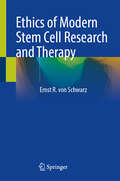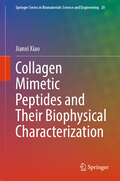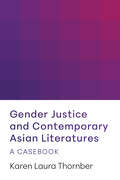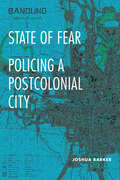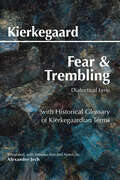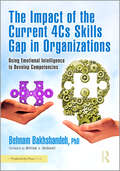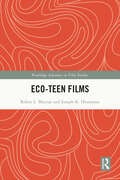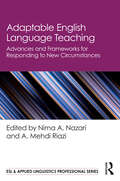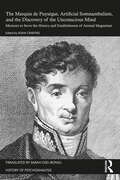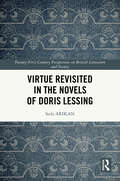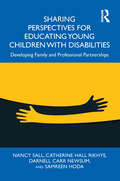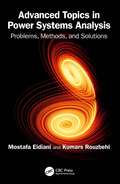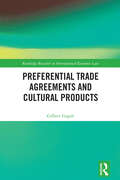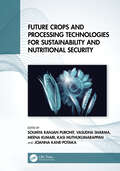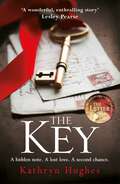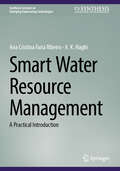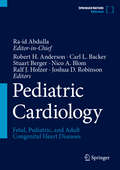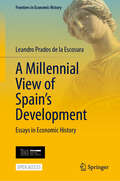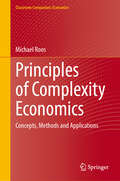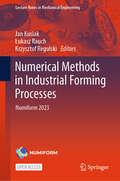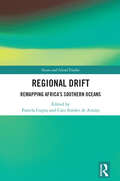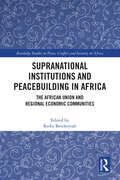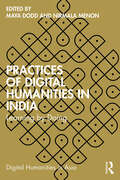- Table View
- List View
Ethics of Modern Stem Cell Research and Therapy
by Ernst R. von SchwarzThis book provides an authoritative and comprehensive overview on the ethical issues surrounding the most promising and most controversially discussed topic in modern biotechnology and medicine, stem cell therapy. It is written by a scientist who has been involved in the basic research of stem cell therapy for over 20 years and was part of the initial experimental studies demonstrating benefits and damage repair using stem cells, and who also is a clinical cardiologist involved in the clinical studies of stem cell therapy in patients with mainly cardiovascular and neurodegenerative diseases from its early stage until now. The book starts with a brief overview of the history of stem cell research, the administrative and regulatory aspects including the federal governmental changes with every political administration over the last 20 years, and the stand of the FDA on research and therapy. It also discusses the issues of medical tourism, patient funded studies, false marketing claims, and the ethical and religious aspects of stem cell research, anti aging research, and immortality research including the Roman Catholic Churches view on embryonic stem cells. Ethics of Modern Stem Cell Research and Therapy will be a valuable resource for clinicians, physicians, and researchers who are looking to either conduct or use stem cell therapies. It offers a one-stop guide to the current regulations of the FDA as well as the potential that stem cell therapies have on many degenerative diseases.
Collagen Mimetic Peptides and Their Biophysical Characterization (Springer Series in Biomaterials Science and Engineering #20)
by Jianxi XiaoThis book embarks on an enlightening journey through the molecular landscape of collagen mimic peptides, shedding light on their significance and potential. In the intricate realm of biomolecules, collagen's preeminence as the most abundant protein in the human body, forming the foundational scaffolding of tissues and organs, renders it a subject of profound scientific interest. It explores diverse facets related to collagen mimic peptides, spanning aspects such as bioinformatic analysis, synthetic strategies, pathological collagen targeting, and the construction of homotrimeric, heterotrimeric and self-assembled peptide models. Furthermore, it provides an exhaustive investigation into biophysical techniques, encompassing Circular Dichroism (CD), X-ray crystallography, Nuclear Magnetic Resonance (NMR), Fluorescence, and Raman spectroscopy, thereby empowering researchers to unravel the structural intricacies of these peptides. The book unravels the profound implications of collagen mimic peptides across a spectrum of scientific domains, including protein science, biomaterials, bioanalysis, and beyond. Its accessibility and insights cater not only to seasoned researchers but also to undergraduate and graduate students eager to delve into the complexities of this fundamental protein.
Gender Justice and Contemporary Asian Literatures: A Casebook
by Karen Laura ThornberThis casebook investigates how diverse writers from across East, South, and Southeast Asia and their diasporas have engaged with the struggle for gender justice. Each chapter analyzes works of literature originally written in Bengali, Chinese, English, Indonesian, Japanese, Khmer, Korean, Marathi, Thai, and Vietnamese.Aimed at both specialists and nonspecialists, Gender Justice and Contemporary Asian Literatures addresses such subjects as gender imparity in male-dominated professions; the lives of migrant sex workers and caregivers; the fight against reproductive, family, non-partner, and intimate partner violence; and norms of shame and silence surrounding violence against women. Informed by the author's deep knowledge of literature, history, culture, law, and social conditions, this book will be a resource for instructors and students in gender studies, women's studies, ethnic studies, Asian studies, Asian American studies, Asian diaspora studies, comparative literature, and world literature.
State of Fear: Policing a Postcolonial City
by Joshua BarkerIn State of Fear, Joshua Barker reckons with how fear and violence are produced and reproduced through everyday practices of rule and control. Examining the ethnographic and historical genealogies of Indonesian policing, Barker focuses on the city of Bandung, which is permeated by anxieties about security, in spite of the fact that it’s a relatively safe city according to the data. Drawing from his fieldwork there during the latter years of the authoritarian New Order regime, Barker traces the complex relationship between the state and vigilante groups like neighborhood watch patrols and street gangs. Through interviews with police officers, vigilantes, and street-level toughs, he uncovers a struggle between two visions of social control that continues to animate policing in Indonesia: the modern, bureaucratic approach favored by the state, and a territorial approach that divides the city into fiefdoms overseen by charismatic individuals of authority. Synthesizing insights from in-depth ethnographic, historical, and theoretical work, Barker reveals how authoritarianism can take root not just from the top down but also from the bottom up.
Fear and Trembling: Dialectical Lyric (Hackett Classics)
by Søren Kierkegaard"Faithful to the original Danish text and eminently readable, Jech's translation of Fear and Trembling admirably communicates the literary qualities of Kierkegaard's text, as well as his occasional fits of inspiration. Jech displays an unusual sensitivity not only to the literary/linguistic qualities of Kierkegaard&’s prose, but also to his (often realized) aspirations to philosophical precision. As presented by Jech, Kierkegaard is not simply a gifted writer and speculative theologian dabbling in philosophy, but a philosopher concerned to limn the optimal role of philosophical reflection, and to do so experimentally, especially with respect to matters of morality and faith. The translation is furthermore supplemented by very helpful explanatory notes that convey Kierkegaard&’s own erudition and the multiple influences upon his thinking. The Historical Glossary will become a valuable reference tool for students and scholars of Kierkegaard&’s writings. It is likely to play a welcome role in encouraging an improved understanding of what Kierkegaard means when he employs his idiosyncratic categories, allusions, and vocabulary." —Daniel Conway, Professor of Philosophy and Humanities, Texas A&M University
The Impact of the Current 4Cs Skills Gap in Organizations: Using Emotional Intelligence to Develop Competencies
by Behnam BakhshandehThe shortage of skills in the workforce is one of the major problems facing enterprises today. How American businesses and organizations intend to deal with these issues and operate in a global market under strong competition is one of their primary worries. The only logical and tangible solution to this issue is for the educational system and major businesses and organizations to begin making investments in educating more children and young adults in soft skills like the 21st-century 4Cs skills (critical thinking, communication, creativity, and collaboration) to prepare them to meet the challenges of emerging businesses and technologies. The 21st century has witnessed a rapid transformation in the global workforce and the skills required to thrive in it. Traditional knowledge-based skills alone are no longer sufficient to succeed in today’s complex and dynamic business environment. Instead, organizations increasingly value what is known as the "4Cs" skills: communication, collaboration, critical thinking, and creativity. However, a significant skills gap exists, where many employees lack these crucial abilities. This book explores the impact of the 21st-century 4Cs skills gap in organizations and how it affects their performance, innovation, and competitiveness. The 21st-century 4Cs skills gap poses a significant challenge for organizations across industries. The inability to communicate effectively, collaborate seamlessly, think critically, and foster creativity can hinder productivity, innovation, and competitiveness. As the business landscape continues to evolve, addressing this skills gap is not only a necessity but also a strategic imperative for organizations looking to thrive in the 21st century. Bridging the gap through training, recruitment, and a commitment to a learning culture will be essential for success in the increasingly complex and interconnected world of business.
Eco-Teen Films (Routledge Advances in Film Studies)
by Robin L. Murray Joseph K. HeumannIlluminating the impacts of environmental disasters and climate crises globally, this book examines the experiences of teens grappling with eco-disasters and issues in films of the twenty-first century.With an emphasis on teen activism, international settings and filmmakers, and marginalized perspectives, this book showcases teens on film that are struggling with present and future everyday eco-disasters amplified by climate change. By highlighting and interrogating diverse genres of teen films in which young adults encounter, address, and battle environmental issues and calamities while also struggling with adolescent development, this book acknowledges the young adult point of view missing from most critical ecocinema research and underlines connections between the more complex ‘coming-of-age’ themes found in teen films with ecocinema themes and approaches. The films examined navigate increasingly realistic conditions, even in fantastical settings, as they showcase teens’ relationships with and responses to environmental issues and eco-disasters. Emphasizing teen activism and under-represented intersectional perspectives outside Hollywood, it establishes the eco-teen film as a notable subgenre.This book will be of interest to students and scholars of film studies, ecocriticism, and environmental studies, especially those with a particular interest in ecocinema and/or ecocritical readings of films.
Adaptable English Language Teaching: Advances and Frameworks for Responding to New Circumstances (ISSN)
by A. Mehdi Riazi Nima A. NazariIn an age of rapid technological transformation and evolving teaching settings, the ELT community must adapt to the needs of emerging situations and a diverse range of learners. Adaptable English Language Teaching addresses this need by bringing together contributions from renowned scholars around the world with insights on all major areas of English language teaching with an emphasis on adaptability—of teaching method, context, skills, and priorities.Organized around an innovative past-present-future structure, chapters offer methods, strategies, and perspectives that are adaptable to any difficult or under-resourced context. It delves into engaging through online applications, understanding emerging trends in computer-assisted language learning and teaching, and the implementation of virtual classroom and multimodality in ELT.Given its multifaceted focus, this book will provide ELT practitioners, trainers, trainees, and researchers with invaluable insights and research findings to effectively navigate and adapt to emerging circumstances.
The Marquis de Puységur, Artificial Somnambulism, and the Discovery of the Unconscious Mind: Memoirs to Serve the History and Establishment of Animal Magnetism (The History of Psychoanalysis Series)
by Adam Crabtree Sarah Osei-BonsuThe Marquis de Puységur, Artificial Somnambulism, and the Discovery of the Unconscious Mind presents the first full English translation of a foundational text in the history of psychodynamic thinking, and provides a contextual explanation of its contemporary significance.Written by Puységur in 1784, Memoirs to Serve the History and Establishment of Animal Magnetism describes the author’s exploration and discovery of “artificial somnambulism,” a state that reveals insights into the subconscious mind. Building on the healing techniques of Franz Anton Mesmer, Puységur kept detailed notes on his practice with patients, including their names, symptoms, and follow-up information, providing a unique insight into his process. The full text of this original publication is presented here, complemented by a historical introduction and editor’s notes.The Marquis de Puységur, Artificial Somnambulism, and the Discovery of the Unconscious Mind will be of great interest to academics and scholars of psychoanalysis, psychotherapy, and the history of psychology, hypnosis, and mental health. It will also appeal to practicing clinicians.
Virtue Revisited in the Novels of Doris Lessing (21st Century Perspectives on British Literature and Society)
by Seda ARIKANThe ethical approaches to literature have come into prominence in the twentieth century, calling for a ‘turn to ethics’ in the studies of humanities, in general, and literary studies, in particular. By leading the ethical turn in literature, many theorists proposed a moral-oriented approach to literature, which is still a significant part of literary criticism. The ethical turn in literature has changed the spirit of literary criticism in the direction of virtue and value-based approaches. In this respect, this study scrutinises Doris Lessing’s novels in light of virtue ethics in general and ‘virtue politics,’ ‘care ethics,’ and ‘Sufi virtue ethics’ in particular. Lessing’s connection to virtue ethics, which is implicitly or explicitly reflected in her novels, is examined by giving the panorama of ethical movements whose common point is virtues. This study asserts that Lessing implements an ethical concern in her novels, which is based on her own understanding of virtue ethics.
Sharing Perspectives for Educating Young Children with Disabilities: Developing Family and Professional Partnerships
by Nancy Sall Catherine Hall Rikhye Darnell Carr Newsum Samreen HodaThis important book is an exploration of the ways parents, teachers and academics view the development and schooling of young children with disabilities. It offers an in-depth examination of the common and critical issues that emerge as children and their families first enter the school system, navigate the educational landscape and learn to advocate for their rights. Each chapter of the book presents a parent’s perspective of significant issues, followed by a teacher’s perspective. From their stories, numerous themes are identified and connected to the academic literature. The experiences shared and the literature reviewed address the challenges, successes and opportunities for increased understanding that emerge as parents and educators work together toward a common goal. Sharing Perspectives for Educating Young Children with Disabilities is essential reading for all pre-service and in-service early childhood and special education professionals and parents engaging in the process of listening carefully to others with the aim of supporting the education of young children.
Advanced Topics in Power Systems Analysis: Problems, Methods, and Solutions
by Mostafa Eidiani Kumars RouzbehiElectric Power Systems Analysis is one of the most challenging courses in the Electric Power Engineering major which is taught to junior students. Its complexity arises from numerous prerequisites, a wide array of topics, and a crucial dependence on computational tools, presenting students with significant challenges.This book serves as a continuation of our previous book, Fundamentals of Power Systems Analysis 1: Problems and Solutions, specifically delving into advanced topics in power systems analysis.The structure of the Advanced Topics in Power Systems Analysisis as follows: Economic Load Dispatch, Symmetrical and Unsymmetrical Short Circuits, Transient Stability Analysis, Power System Linear Cintrols, and Key Concepts in Power System Analysis, Operation, and Control.The structure of the Fundamentals of Power System Analysis 1 is as follows: Introduction to the Power System, Transmission Line Parameters, Line Model and Performance, and Power Flow Analysis.In brief, advantages associated with delving into both books are as follows: A variety of tests to prepare for employment exams. Electrical engineers practicing power system analysis can find almost everything they need. This book contains both difficult and easy problems and solutions. Readers have the capability to solve problems presented in this book solely using a calculator, without dependence on computer-based software. This book provides power systems concepts through studying two-choice questions. In the end, we had a great time in writing this book, and we truly hope you enjoy reading it as much as we enjoyed creating it!
Preferential Trade Agreements and Cultural Products (Routledge Research in International Economic Law)
by Gilbert GagnéThis book discusses the treatment of cultural products within international trade law, focusing on preferential trade agreements.Trade and culture intersect when cultural products are involved. These mainly encompass cinema, broadcasting, music, videos, and publishing, either in traditional or digital formats. As such products reflect the cultural identities of states, they have led to a debate as to whether, or the extent to which, they should be exempted from trade obligations. With multilateral negotiations in gridlock, states have increasingly turned to preferential trade agreements. Concurrently, digital technologies have revolutionized how cultural contents are created and distributed. The book analyzes the provisions relating to cultural products within trade agreements, as well as their relationship with the provisions and guidelines on cultural goods and services under the UNESCO Convention on Cultural Diversity. Drawing comparisons between states as to the treatment of cultural products in preferential trade agreements and considering the norms and provisions relating to cultural products under different regimes, the book offers a truly comprehensive overview of the evolution of the trade and culture debate.The book will be of interest to researchers in the fields of cultural products, trade agreements, digital technology, trade law, and cultural diversity.
Future Crops and Processing Technologies for Sustainability and Nutritional Security
by Vasudha Sharma Soumya Ranjan Purohit Meena Kumari Kasi Muthukumarappan Joanna Kane-PotakaOur current food system faces challenges across the board – from ensuring food security and reducing environmental impact to managing costs and minimizing waste. Fortunately, cutting-edge food processing technologies play a critical role in paving the way for a more sustainable future. Taking a two-track approach, Future Crops and Processing Technologies for Sustainability and Nutritional Security presents sustainable technologies and emerging crops that are capable of ensuring nutritional security. There are various crops that are nutritious but under-utilized. Crops covered in the book are those that are climate resilient and exhibit less use of water and zero discharge to environment, such as millets and legumes like chickpea, groundnuts, and pigeon pea.KEY FEATURES: Provides a comprehensive literature review on the opportunities and challenges in achieving sustainability and nutritional security Presents compatible, relevant crops to address both sustainability and nutritional security Discusses the emerging technologies/crops/food products to justify sustainability and potential to ensure nutritional security This book also provides information on all aspects related to the processing and use of sustainable technologies and crops. The use of technologies like 3D printing, novel drying method, high pressure processing, high-voltage treatments, and the proper combination of conventional methods are addressed.
At Mrs Lippincote's (Virago Modern Classics #4)
by Elizabeth TaylorThe debut novel from Elizabeth Taylor - shortlisted for the Booker Prize*Mrs Lippincote's house, with its mahogany furniture and yellowing photographs, stands as a reminder of all the certainties that have vanished with the advent of war. Temporarily, this is home for Julia, who has joined her husband Roddy at the behest of the RAF. Although she can accept the pomposities of service life, Julia's honesty and sense of humour prevent her from taking her role as seriously as her husband, that leader of men, might wish; for Roddy, merely love cannot suffice - he needs homage as well as admiration. And Julia, while she may be a most unsatisfactory officer's wife, is certainly no hypocrite.*'Her stories remain with one, indelibly, as though they had been some turning-point in one's own experience' Elizabeth Bowen 'No writer has described the English middle classes with more gently devastating accuracy' Rebecca Abrams, Spectator 'A Game of Hide and Seek showcases much of what makes Taylor a great novelist: piercing insight, a keen wit and a genuine sense of feeling for her characters' Elizabeth Day, Guardian
The Key: The most gripping, heartbreaking novel of World War Two historical fiction from the global bestselling author of The Memory Box
by Kathryn HughesA hidden note. A lost love. A second chance...From the #1 bestselling author of The Letter, Kathryn Hughes, comes The Key, an unforgettable story of a heartbreaking secret that will stay with you for ever.'A wonderful, enthralling story; one that I didn't want to end' LESLEY PEARSE'Un-put-downable with a twisting plot' My Weekly'A heartbreakingly powerful read' Sun'Shocking, stirring' Woman1956 It's Ellen Crosby's first day as a student nurse at Ambergate Hospital. When she meets a young woman admitted by her father, little does Ellen know that a choice she will make is to change both their lives for ever...2006Sarah is drawn to the now abandoned Ambergate. Whilst exploring the old corridors she discovers a suitcase belonging to a female patient who entered Ambergate fifty years earlier. The shocking contents, untouched for half a century, will lead Sarah to unravel a forgotten story of tragedy and lost love, and the chance to make an old wrong right . . .It's time to discover what a million readers already know. No one grips your heart like Kathryn Hughes . . .'Oh wow! This story broke my heart then filled it with joy then broke it all over again! I adored The Letter and The Secret but this I have to say was my favourite. Heartfelt and poignant an absolute joy ⭐ ⭐ ⭐ ⭐ ⭐' REAL READER'A sheer joy to read . . . Wonderfully romantic with beautiful characters ⭐ ⭐ ⭐ ⭐ ⭐' REAL READER'I have finished this book with tears in my eyes but a smile on my face ⭐ ⭐ ⭐ ⭐ ⭐' REAL READER'A beautifully told, tragic tale . . . restoring your faith in the kindness of strangers ⭐ ⭐ ⭐ ⭐ ⭐' REAL READER
Smart Water Resource Management: A Practical Introduction (Synthesis Lectures on Emerging Engineering Technologies)
by A. K. Haghi Ana Cristina RibeiroAdvanced methods for water consumption management can help save water and financial resources. This book introduces efficient methods and practical approaches for water consumption management through computational modeling to forecast water demand and optimization and through smart technology to help prevent or reduce water loss using the Geographic Information Systems (GIS) and the Internet of Things (IoT). The book will be a useful for researchers and graduate students focusing on research initiatives in the field of water resource management, and for researchers and practicing engineers in water utility companies.
Pediatric Cardiology: Fetal, Pediatric, and Adult Congenital Heart Diseases
by Ra-Id AbdullaThis reference work aims to be the primary resource in the field of heart disease in children and adult congenital heart disease. It contains nearly 100 chapters covering all aspects of heart disease in three populations: fetus with acquired and congenital heart diseases, children with acquired and congenital heart diseases, and adults with congenital heart diseases. Divided into five main sections, the book provides a comprehensive, up-to-date, and continuously revised overview of what is known in the field as well as resources for practical use such as normal values, medication information, and review of published guidelines. The first section of the book includes historical background on congenital heart disease and the evolution of medical, surgical, and catheter therapeutics. The fetal heart disease section comes next and covers cardiovascular embryogenesis, etiological mechanisms, diagnostic tools, presentation and management, cardiomyopathies, arrhythmias, perinatal management, and emergencies. The bulk of the book lies in the third section on pediatric cardiology, which examines not only basic science, assessment, and therapies but also a wide variety of specific acquired and congenital diseases such as valvular lesions, arterial diseases, cyanotic heart diseases, cardiomyopathies, cardiac tumors, and pulmonary hypertension. This is followed by the section on adult congenital heart diseases, discussing echocardiography, electrophysiology, neurodevelopment, and a variety of unique aspects of congenital heart disease in the adult years. The final section of the book focuses on pharmacology with chapters on inotropes, vasopressors, diuretics, and more. Pediatric Cardiology: Fetal and Pediatric Heart Diseases & Adult Congenital Heart Diseases is an essential reference for physicians, residents, fellows, medical students, nurse-practitioners, and allied health professionals in cardiology, pediatrics, cardiac surgery, and imaging/radiology.
A Millennial View of Spain’s Development: Essays in Economic History (Frontiers in Economic History)
by Leandro Prados de la EscosuraThis open access book presents the evolution of the Spanish economy over the past seven centuries since the end of the Reconquest and examines how much economic progress has Spain achieved, as well as its impact on living standards and income distribution over the very long run. It shows that preindustrial Spain was far from stagnant, although levels of output per head in the early nineteenth century were not much different from those on the eve of the Black Death (1348). It further discusses how phases of simultaneous per capita output and population expansion and shrinkage alternated, lending support to the recurring growth and frontier economy hypotheses. While a collapse in the 1570s gave way to sluggish growth and higher inequality after a long phase of sustained growth and lower inequality, the book shows how real per capita income has improved substantially over the last two centuries, driven by increased labor productivity, and derived from more intense andefficient use of physical and human capital per worker. Presenting exposure to international competition as a stimulus for this development, the book sheds light on the underperformance of Spain up to 1950 in a European comparison and describes the catch-up of Spain’s economy with more advanced countries until 2007. Finally, the book explains how modern economic growth is associated with an increase in the material well-being of its inhabitants, as the most dynamic economic phases of the last century have been associated with an improvement in income distribution, although the relationship between growth and inequality has not been linear. This book is a must-read for students, researchers, and scholars of economics and economic history interested in a better understanding of cliometrics, long-run analyses, economic development, economic growth, as well as the Spanish economy.
Principles of Complexity Economics: Concepts, Methods and Applications (Classroom Companion: Economics)
by Michael RoosThis textbook serves as an introduction to the rising field of complexity economics. In thirteen chapters, it provides a comprehensive and systematic overview of the concepts and methods of complexity economics and their applications to economic issues. The book explains that the complexity approach is not just another method, but a worldview that is different from the one of academics with neoclassical training. By contrasting complexity economics with neoclassical economics, the readers are induced to reflect on their own unconscious beliefs about the economic world and develop their own approach to dealing with the pervasive complexities and uncertainties of reality. The first five chapters serve as an introduction and overview. Chapters 6 - 12 present the core concepts of the book. Each of the seven chapters introduces a key concept of complexity and provides applications to economics topics. The final chapter discusses the implications of complexity thinking for economic policy and for the future development of economics.This textbook addresses advanced undergraduate students and graduate students of economics, interested in a better understanding of the concepts and the way of thinking in complexity economics, as well as in acquiring a sound technical foundation to understand most of the research literature.
Numerical Methods in Industrial Forming Processes: Numiform 2023 (Lecture Notes in Mechanical Engineering)
by Jan Kusiak Łukasz Rauch Krzysztof RegulskiThis open access book comprises selected papers presented at the NUMIFORM 2023 conference, where recent developments, innovations and advances in numerical methods for material forming and shaping through plastic deformation were discussed. The conference topics include the broad areas of material behaviour and modelling and its numerical implementation; process modelling (forming, joining, machining, casting, welding/joining and additive manufacturing, etc., of metals, polymers and composites) and its numerical implementation; and conventional and novel methods of forming and joining metals and polymer and composite processing. This book serves as a valuable reference for academicians and industry professionals alike.
Civic Pedagogies: Teaching Civic Engagement in an Era of Divisive Politics (Political Pedagogies)
by Lauren C. Bell Allison Rank Carah Ong WhaleyThis book comes at a crucial time as the USA and countries around the world wrestle with an ongoing period of democratic backsliding that shows little sign of abating. Alarmingly, study after study shows that younger people are not convinced that democracy will endure – and that a sizable number are no longer convinced that it should. Especially as changing educational and political landscapes make efforts to educate for democracy both more necessary and more fraught, contributors to this book offer innovative pedagogies and praxis grounded in political and civic theories aimed at strengthening democratic norms, practices and institutions.
Regional Drift: Remapping Africa’s Southern Oceans (Ocean and Island Studies)
by Pamila Gupta Caio Simões de AraújoThis book examines the Southern Indian Ocean corridor as a geographic, geological, and atmospheric space, taking a critical oceanic humanities approach while never losing sight of the land and water interface.Using a range of disciplinary approaches and materials, Gupta and de Araújo hydrate territorial and land-based imaginations of the Southern African region by conceptualizing its oceanicity as a fluid and more than human materiality, synthetic situation, and geopolitical nexus. With a diverse set of case studies, they explore a variety of conceptual framings and methodologies, including science-technology-society studies, tourism and heritage studies, history, and international relations (IRs) – among others. The contributors cover a complex and vast imaginative geography, cross-cutting Portuguese, German, and British colonial traces in the region, and exploring land, water, and submerged spaces, from coastal towns and bridges to islands and archipelagos.A fresh approach to thinking about Atlantic and Indian Ocean coastlines in a relational and scalar manner for scholars across a range of disciplines focussed on Southern Africa.
Supranational Institutions and Peacebuilding in Africa: The African Union and Regional Economic Communities (Routledge Studies in Peace, Conflict and Security in Africa)
by Redie BereketeabThis book analyses the role of the African Union and regional economic communities in contributing to peacebuilding in Africa. Big and small conflicts rage across the African continent, and this book argues that the African Union and the five regional economic communities have the potential to greatly contribute to peace and peacebuilding In Africa.Looking across the African Union and the five regional economic communities (the AMU, ECCAS, ECOWAS, IGAD, and SADC), the book considers in detail the organizations’ programmes, engagement, endeavours, success and failure of activities of peacebuilding in their respective regions. Overall, the book argues that an institutionalised and formalised relationship between the African Union and the regional economic communities would not only be decisive for the prospects for peace in the region but would also serve to strengthen the continent’s role on the global stage through asserting its agency, owning its agenda, and designing its own solutions and mechanisms for addressing problems.Drawing together an international team of prominent experts, this book will be of interest to researchers, policymakers, NGOs, activists, and regional and international actors working on African politics, security, governance, and economics.
Practices of Digital Humanities in India: Learning by Doing
by Nirmala Menon Maya DoddThis book represents examples of innovations in digital humanities (DH) efforts across India while theorizing disparate challenges and its negotiations. It examines DH projects that have spanned private and public efforts, institutionally sanctioned lab-work, and crowd-sourced programmes of public significance and shows how collectively they demonstrate the potential paths of DH in India. The essays in the volume highlight the two fundamental challenges for DH – acts of curation of new scales and the creation of platforms that can assist in the collation and analysis of these digital archives – and changes in learning behaviour. They examine the transformation of the university, and the opening up of new relationships between knowledge and audience in concomitant spaces of scholarship such as libraries, archives, and museums. The volume brings to the fore citizen efforts to document, record, and preserve as well as create new avenues of study and forge networks of scholarship that look very different from those of traditional academia. It also foregrounds the challenges of location and addresses the questions of how DH should be taught in India and how to build digital infrastructures. A go-to guide for DH efforts in India, this book will be an essential text for courses on digital humanities, library and information sciences, and the future of experiential learning.
